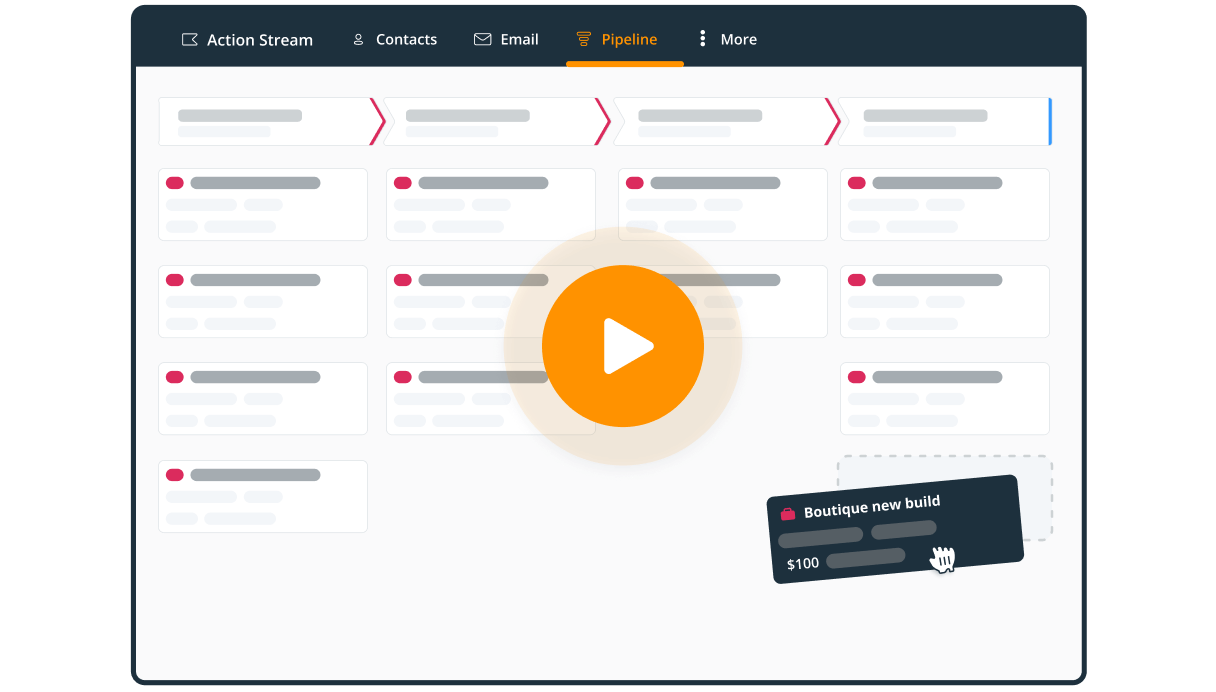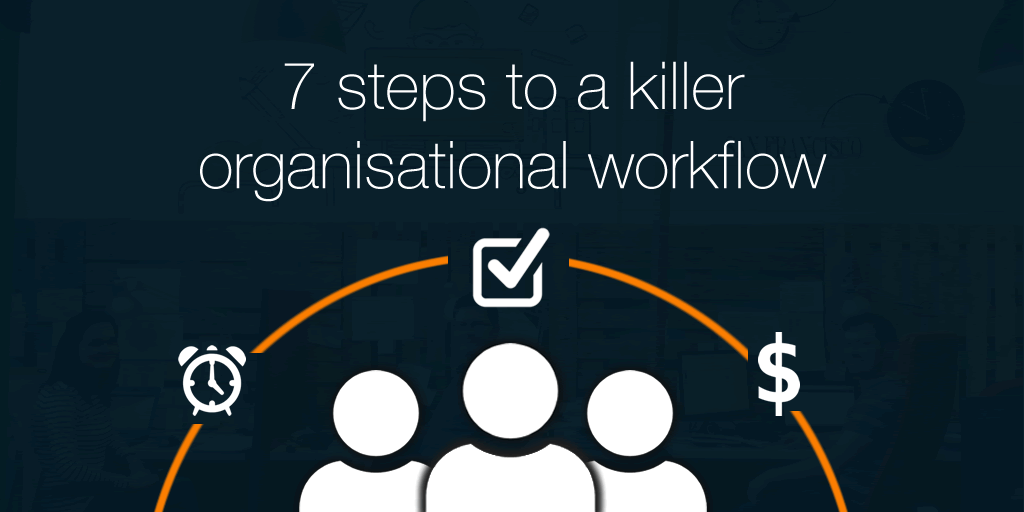

Have you ever thought about what it takes to build an unstoppable sales team?
We’re about to dive into the art and science of training standout salespeople. So grab a cup of coffee and let’s get started!
Why sales training is important
You might think, “Hey, I’m just a small business. Why do I need to bother with formal sales training?” Great question! Here’s the thing—even if you’re running a two-person show, selling is what keeps the lights on.
Think of sales training as a small investment for a big return. It’s like planting a seed. At first, you might not see much. But give it some water and a little sunlight, and voila—you’ve got a thriving plant.
Similarly, with the right sales training, you could turn a hesitant prospect into your biggest customer, boosting your revenue and helping your business grow.
So, no matter the size of your business, sales training is worth every penny. After all, even the tallest trees start as tiny seeds.
How to implement sales training techniques
Small businesses can use creative ways like peer-to-peer training or online resources to make it happen. It’s not about the size of the training, but the impact it has.
Here are a few steps you can take:
- Identify your needs: No two businesses are the same, right? So, the first step is to understand your unique needs. What skills is your sales team lacking? Where are they already excelling? A simple skills audit will do the trick.
- Define clear learning objectives: Next, based on what you’ve found, create clear and achievable learning objectives. Think about it like a roadmap for your team. Where do you want them to be, and what steps are needed to get there?
- Choose the right training material: Now, it’s about picking the right tools for your toolbox. This could be online courses, webinars, or maybe even bringing in a sales coach. The key here is to blend different learning methods to keep it interesting and engaging.
- Implement a peer-to-peer learning program: Here’s a fun idea! Have your team members train each other. This peer-to-peer approach not only fosters a supportive environment but also encourages the exchange of ideas and experiences. Besides, every person on your team has a unique blend of experience and skills so they can teach each other and learn from each other.
- Track progress and adjust: Finally, remember that Rome wasn’t built in a day. Be patient, and regularly check in on your team’s progress. Are they meeting the learning objectives? If not, don’t be afraid to adjust your strategy.
Implementing sales training might seem daunting at first. But, with these steps, you’ll have a battle-ready sales team before you know it. It’s all about taking that first step. And, as always, don’t forget to celebrate achievements along the way!
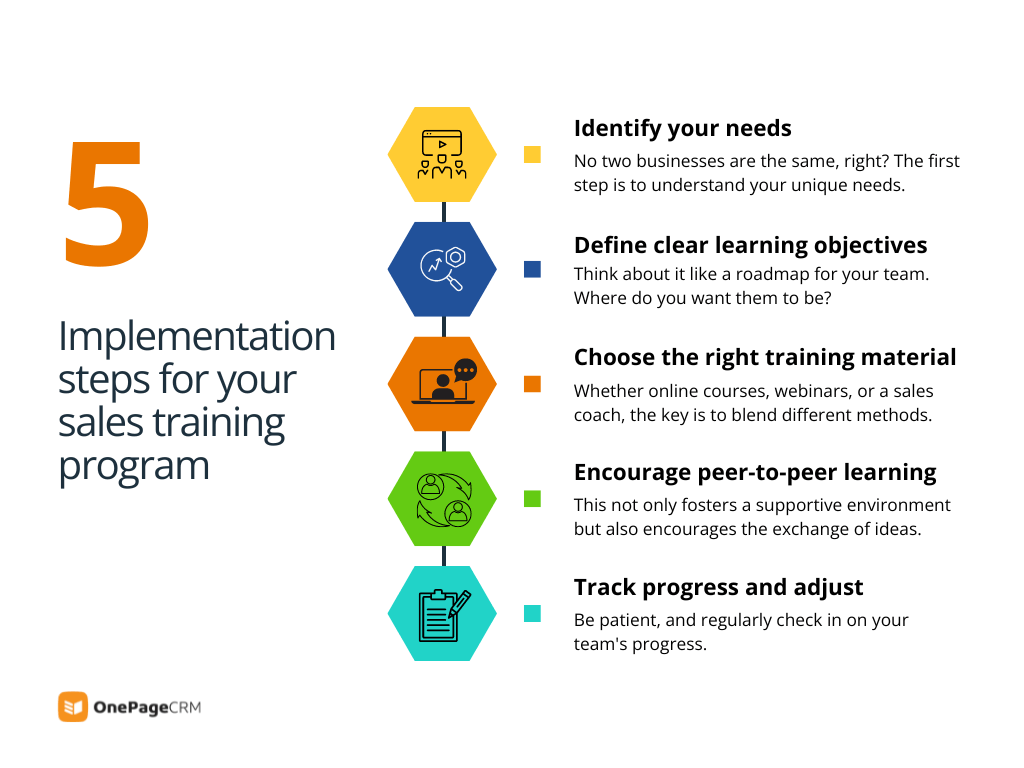
Top 6 criteria for choosing the best sales training techniques
Did you know that struggling sales reps are five times more likely to report they aren’t fully onboarded & productive one year after starting their job?
That’s why good sales training is so important for the future success of your newly hired reps.
But what exactly does good sales training look like?
Let’s figure this out:
- Targeted content: A one-size-fits-all approach won’t cut it. Good sales training is tailored to the needs of your team. It reflects the unique challenges they face and the specific areas they need to improve on.
- Engaging material: Let’s be honest, nobody wants to sit through a snooze-fest. Effective training material should be interactive, engaging, and fun! Think multimedia content, gamified learning, or real-world scenario simulations.
- Continuous learning: Good training isn’t a one-off event. It’s a continuous process. A regular drip-feed of lessons and refreshers helps reinforce learning and keep skills sharp.
- Practical application: The best training is useless if it doesn’t translate into real-world results. Good training provides practical skills that can be immediately applied on the job.
- Measurement and feedback: Finally, a good training program doesn’t just end when the training does. There should be a system to measure the impact of training, receive feedback, and make necessary adjustments.
- Documentation: Documenting processes is like creating a user manual for your business. It ensures that every new hire and existing team member knows what is expected of them and how to achieve it.
A good sales training program is interactive, consistent, and relevant. It should provide your team with both the knowledge of your products and the skills to sell them. It’s like giving your sales team both the map and the compass to navigate the competitive business landscape.
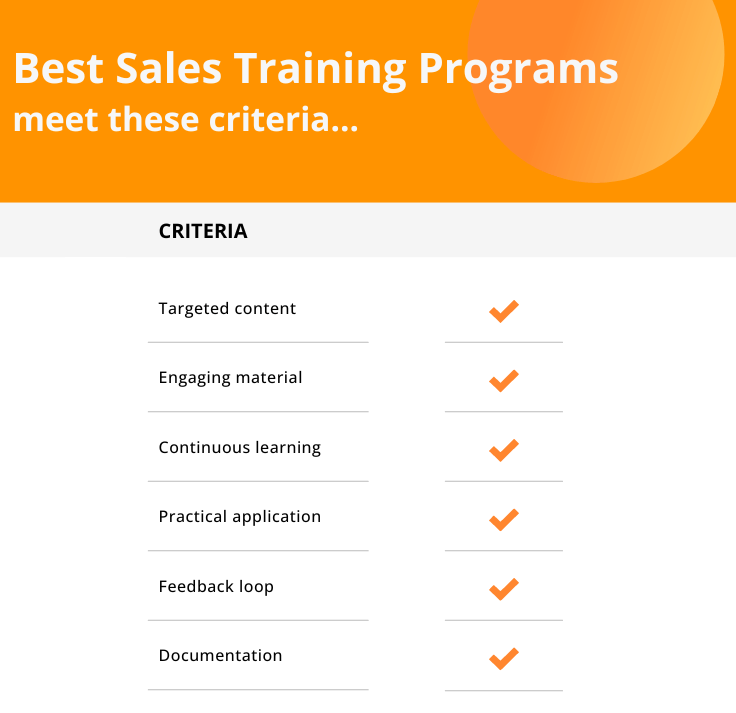
What to cover in sales training
To ensure your sales training is top-notch, there are several crucial topics and skills that must be covered:
- Product knowledge: Understanding the ins and outs of the product or service you’re selling is paramount. This includes features, benefits, and how it stacks up against the competition.
- Sales techniques: Train your team on the art of persuasion, negotiation, and closing techniques. This can include everything from the SPIN selling technique to the Challenger Sale.
- Customer interactions: Equip your team with the skills needed to effectively communicate with customers. This includes active listening, empathy, handling objections, and tailoring the sales pitch to the customer’s needs.
- Prospecting and lead generation: Cover strategies for finding and attracting potential customers. This should include guidance on how to qualify leads and use tools like LinkedIn or CRM software to manage and track interactions.
- Time management: Teach your salespeople how to prioritize their efforts, manage their pipeline, and make the best use of their time.
- Sales ethics: Instill in your team the importance of ethical selling practices. This helps build long-term customer relationships and maintain a positive reputation for your company.
The goal of your sales training is not just to dump information on your sales team, but to equip them with practical skills and knowledge they can apply immediately.
As they say, knowledge is power, but application is the key.
5 sales training techniques (effective and low-cost)
Let’s dive straight into the heart of the matter—effective sales training techniques.
Remember how we said that knowledge is power, but application is key? That’s exactly what we’re aiming to achieve here.
This next section has 5 practical, proven techniques that will supercharge your sales training.
1. Role-playing technique
Role-playing in sales simulates sales scenarios for trainees to practice their skills, reactions, and responses. It is like the dress rehearsal before the big show. It’s an opportunity for your salespeople to apply all the knowledge and skills they’ve been soaking up in a safe, controlled environment. And just like rehearsals, it’s a time for making mistakes, learning, adjusting, and improving.
You could set up scenarios that range from the easy-peasy ‘warm leads’ to the tough-as-nails ‘I’m just looking’ customers. This technique not only strengthens the trainees’ product knowledge and sales techniques but also builds their confidence.

How about throwing in some unexpected objections or questions for them to handle? You’ll see how they think on their feet. And the best part? The feedback and learning that happens immediately afterward. Now, that’s what we call practical learning!
This will also promote knowledge exchange within the team.
2. Real-world sales training
Imagine being a newbie salesperson, fresh from a theoretical training program, thrown straight into the deep end, dealing with a hard-nosed prospect. Sounds nerve-racking, doesn’t it?
That’s where real-world training comes in. It gives your team a realistic taste of what they’ll face, minus the high-stakes pressure. And the best part is, it’s beneficial for both rookies and seasoned salespeople alike.
For instance, you could set up a ‘retail day,’ where your sales team will gain firsthand experience dealing with a wide variety of customer personas. Or, maybe arranging a ‘field day,’ where they accompany senior salespeople to real sales meetings and sales calls to observe and learn.

This real-world immersion can be a powerful learning tool, providing an understanding of customer behaviors, industry trends, and effective sales tactics that go way beyond any classroom instruction.
So when should you use this technique? Whenever you introduce a new product, strategy, or when the team needs a morale boost. It’s like a reality check that prepares them for what’s out there, before it actually happens. Plus, it’s an excellent way for your team to bond, share experiences, and learn from each other.
You can also encourage your salespeople to talk to existing customers and get to know their pain points better. This will help them refine their conversations with prospects and potential clients and understand where prospects are coming from.
3. Group discussions

Group discussions encourage active participation and stimulate creative thinking among your team members. They create a safe space where everyone can express their viewpoints, share experiences, and discuss challenges. It’s a real-time, dynamic exchange of ideas where everyone has a voice, and every voice counts.
For instance, you could initiate a discussion on a common sales hurdle, like handling customer objections. Ask the team members to share their experiences and strategies. You’ll find that everyone has a different approach, and hearing these can broaden everyone’s understanding of the problem, as well as potential solutions.
Or, you can have a brainstorming session where the team discusses different ways to pitch a new product. You’ll be surprised at the variety of innovative ideas that can spring up from such a discussion.
In group discussions, learning is collaborative and organic. The potential for discovery is not just linear, it’s exponential! So, remember to include them regularly in your sales training program.
4. Feedback loops and reviews
Regular feedback loops and reviews are a powerful, yet low-cost, sales training technique that small businesses can utilize to great effect.
Think of it as a natural extension of group discussions. After a sales call or presentation, team members can regroup to discuss what worked, what didn’t, and how they can improve in the future. This constructive feedback can provide invaluable insights into individual performance as well as overall sales strategies.

Imagine, for example, a sales rep struggling to close deals. A feedback session could reveal that they’re not fully understanding the clients’ needs or missing out on some key product benefits during their pitch. These insights might not surface without the collective wisdom and varied perspectives of the team.
Here are some tangible ways you can integrate feedback loops and reviews into your sales training:
- One-on-one coaching: Pair a seasoned sales rep with a newbie for personalized feedback. This could be as simple as the experienced rep listening in on calls and suggesting tweaks. Just like a seasoned chef guiding an apprentice, one-on-one feedback can significantly speed up the learning curve.
- Post-meeting analysis: After a sales meeting or call, have a group discussion to analyze what went well and what could be better. Think of it as a brainstorming session that can generate innovative solutions and strategies.
- Peer review: Encourage team members to review each other’s work, providing a fresh perspective and new insights. It’s like getting a second opinion at the doctor’s office—sometimes, a different vantage point can spot things you might miss.
- Call recordings: Listen back to as many calls as possible. Pay attention to your tone. Do you sound confident? Are you nervous? Do you use filler words or too much slang? When you start recording your calls, a lot of times you’ll be like, ‘Oh my God! The client just told me exactly what I wanted to hear but I was so busy thinking about what to ask him next. That’s why I missed it!’”
The key to effective feedback loops and reviews is fostering an environment of trust and open communication. When team members feel safe sharing their thoughts and receiving feedback, they’re not only improving their sales skills but also building a stronger, more cohesive team.
5. E-learning sales training resources
E-Learning offers a flexible and accessible platform where sales reps can sharpen their skills at their own pace. From in-depth online courses to self-guided resources, there’s a wealth of knowledge at your fingertips.
Think about it like having a professional development library open 24/7, where you can pick up a book, listen to a podcast, or watch a webinar whenever it suits you. This technique is particularly valuable for individuals who prefer self-paced learning, and it’s also a cost-effective solution for small organizations.

If you want to make the most out of e-learning, start with a clear objective in mind. Are you trying to improve your negotiation skills, learn about product features, or perhaps understand customer psychology better?
Then choose online resources that align with these goals. It could be a highly-rated sales podcast, a best-selling book, or an expert-led webinar.
The real magic happens when you apply what you learn. So, after each e-learning session, take a moment to reflect on how you can implement your new knowledge in real sales scenarios.
Sales training is about continuous learning
The world of sales is always evolving, and so should we.
There’s no endpoint to our journey of learning. Just like a well-curated library, the resources for growth and development in sales are endless, and they’re there for you to tap into, round the clock.
So whether it’s refining your negotiation skills, getting to grips with the latest product features, or delving into the complexities of customer psychology, there’s a learning resource out there that’s got your back.
And remember, the real power lies in applying what you’ve learned — so after each learning session, take a moment to ponder, how can I put this knowledge to use in my next sales scenario?
Keep learning, keep growing, and keep selling!

